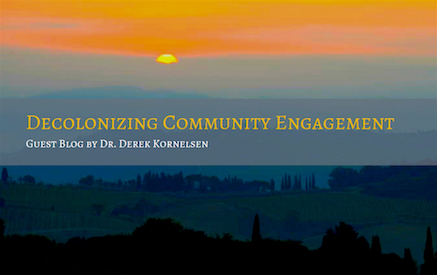Decolonizing Community Engagement
Guest Blog by Dr. Derek Kornelsen
Recently, terms like decolonization and community engagement have become buzzwords in popular discourses about Indigenous health research. But what does decolonization actually mean? How can we really try to decolonize community engagement? If this is to make any sense, and provide any kind of realistic guide for action, we need to start by gaining some sense of how colonization has impacted — and continues to impact — Indigenous communities and Western academic/research institutions. Only then can we consider why community engagement matters and what a decolonized form of community engagement might look like.
Settler Colonialism in Canada
A good starting point for understanding colonialism in Canada is to recognize that there is a distinct form of colonialism at work here — both past and present. This form is called settler colonialism. Typical understandings of colonialism usually refer to a situation where a colonial entity oppresses and manipulates foreign peoples in order to extract wealth and resources — India and South Africa are key examples. In these cases, there is a point at which we see the colonial power officially leaving, and the colonized peoples achieving some level of independence. On the other hand, in cases of settler colonialism, the colonial entity doesn’t leave, but continues to bring in more and more settlers in order to reproduce itself in the colonized space — Canada, USA, Australia, and New Zealand are the usual suspects here. The particularly horrifying aspect of this practice — as scholars like Patrick Wolfe have discussed in depth — is that, in order to reproduce itself in a given place, the settler colonial entity must ‘destroy to replace’. In Canada, we’ve seen this through overt genocidal acts that morphed into the kinds of cultural genocide that have occured throughout the residential school era.
Read more here…
Dr. Derek Kornelsen is an Assistant Professor in the Department of Community Health Sciences at the University of Manitoba. His research focuses on examining/contrasting Western and Indigenous philosophies and institutional frameworks, with a particular emphasis on developing a theoretical framework grounded in an understanding of the dynamics and impacts of Settler Colonialism. This theoretical framework enables a sensitivity to 2 key under-researched areas in Indigenous health and wellness research: the impacts of the disruption of Indigenous peoples’ relationships with land and environment; and strategies for decolonizing key institutions that Indigenous peoples must access (health as well as political, legal, educational, economic institutions). Broadly speaking, this theoretical frame contributes to the development of robust Indigenous determinants of health and wellness. He is currently involved in developing a number of local, national, and international research projects and partnerships in areas of environmental health and Indigenous health and wellness.


